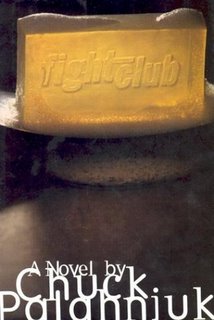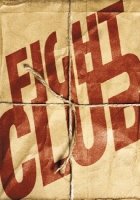
Fight Club is one of my favorite books of all times and certainly is my favorite book by Chuck Palahniuk. In my opinion, it's much more enjoyable than most of his later works (although Choke and Lullaby were also good) because in this one, the gross-out factor of the material never went higher than the laugh factor. For example, in Fight Club, Tyler Durden has a penchant for using body fluids as ingredients for diners at fancy restaurants. It's nasty, but I don't eat clam chowder anyway. In contrast, in Haunted, a woman's newborn is turned into soup and in another scene a woman ends up eating part of her own ass. Actually there is no humor in those moments. It's just horrifying. So for me, Chuck has fallen off track a bit, but that's never dampened my enjoyment of Fight Club.
For those of you who have never read the book or seen the movie (and if you're in that category, what the hell is wrong with you?), it's really simple. An unnamed narrator has issues. He meets a guy on a flight and they end up staying at the same house. They form the fight club in question, which is what it sounds like: a club where men fight. Not boxing, just plain old streetfighting. The narrator's life starts to spiral out of control as Tyler goes on to plan bigger and better things (namely overturning society and instituting a new world order). It all comes to a head in the end. There's a woman in there as well: Marla, who I have to say is the best female love interest ever.
A lot of people have talked about this book as if it's either a crime against humanity or one of the most important works ever written. Of course, there are plenty who just don't care and then there are tons of fanboys who completely don't get what Chuck was trying to say but think they do. A lot of feminists have railed against it for its "misogynistic" tendencies, which shows that they missed the point. The book, in short, is about men who go wild precisely because they don't know how to be men. The narrator's initial rejection of Marla isn't misogyny, it's self-hatred (is that automisanthropy?). In the end, when he's figured himself out and overcome (or killed) his Durden-self, he can then reach out to her have the normal relationship. If Palahniuk was being misogynistic, he would have killed Marla and the narrator (or Joe, or Jack, or whatever you want to call him) would have
become Tyler.
On the other hand, while I enjoy this book immensely because of Chuck Palahniuk's originality and freshness, I don't think this is the key book of the 90s. It might be the key book of the displaced male at the end of the century, and I certainly identified with it, but in the end it's best not to subject it to too much psychoanalytical scrutiny. It certainly has some Nietzchean overtones, but it doesn't quite fit the mold as well as Star Wars fits the Campbellian "Hero With a Thousand Faces" model.
In a lot of ways, it's just a teen book for grown-ups, especially men, about a guy who has completely lost his way but finds it in the end after a lot of misadventures. What makes the book great is not that the subject itself is so bold and new, but that Palahniuk simply wrote the best story about it that I've ever seen. I mean, if you want books about people finding their true selves that are also male-oriented, check out
The Kite Runner or
I Know This Much is True. I wouldn't say Fight Club is a better book than either of those, but it's certainly shorter and a better read most of the time. And it's funnier and has more action. I think Fight Club works because it's a book that says the same stuff, but it's less cerebral about it. Look at the title. Two words express the entire book, whereas you get nothing from the titles of the other two. In short, Fight Club is the non-thinking man's version of that kind of story. The fact that it has such an impact on so many men is kind of disturbing. I mean, if it moved these guys so much, surely The Kite Runner would have them weeping on their knees at the end!
Movie Adaptation
Now this is definitely one of my top five movies ever. It's got all the goodness of the book, but also the incredible visual direction of David Fincher. He completely understood where it was coming from, and this is one time where I thought the entire cast was just great. Edward Norton always does a great job as far as I'm concerned, but I'm not such a fan of Brad Pitt. And yet he was one of the highlights of this movie. Not only his acting, but they gave him such a great look as Tyler. And it was exactly how I thought Tyler might have looked. And Helena Bonham Carter as Marla. Just perfect. The score by the Dust Brothers was one of the few where I thought electronic music perfectly complemented the movie.
Somehow, Fincher managed to stay true to the book while keeping the movie flowing smoothly along. There really isn't any wasted time in the movie. If you have the dvd, take advantage of the commentary from Fincher, Norton, Pitt, and Carter. Unfortunately hers was recorded separately, but the guys are hilarious when they're talking about whatever they're seeing, plus which it's just a bonus for fans of the movie to hear about how certain shots and such were arrived at.


